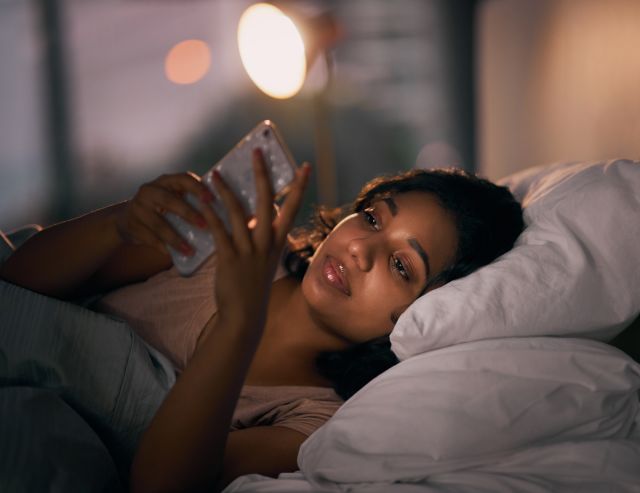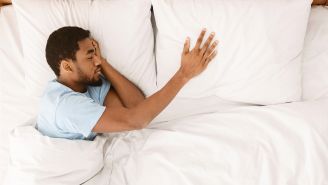Updated on September 20, 2024.
Your sleep-deprived friends may swear by it and you’ve probably read about it online or seen it on drugstore shelves. But can melatonin really help you sleep better or are you better off just counting sheep to get some shut-eye?
What is melatonin and how does it affect my body clock?
First, the basics: Melatonin is a naturally occurring hormone in the brain that your body uses to help regulate your circadian rhythms. These rhythms regulate changes that the body goes through each day over a 24-hour cycle. Circadian rhythms are in turn regulated by a system of chemicals and genes that work together and are known collectively as your biological clock, or body clock.
Circadian rhythms are affected most by light and dark but other factors like physical activity, diet, and temperature can also affect them. Among other vital functions, your circadian rhythms influence your sleep patterns, such as when to sleep and when to wake up each day. They do this in part by causing the release of melatonin in the body.
How and when does the body naturally produce melatonin?
Your body gradually starts making melatonin each day when your eyes begin receiving less and less light, typically as the sun sets each day. This brings on that familiar drowsy feeling. Production of the hormone continues during the night. In fact, melatonin has been called the “Dracula of hormones” because levels rise when it gets dark outside. As dawn approaches, levels begin to drop, letting you know it’s time to rise for the day.
At least, this is how it works in a perfect world. In practice, a lot of factors can interfere with the process of making melatonin. These include:
- Shift work that changes the normal sleep-wake schedule
- Jet lag, from traveling between time zones
- Exposure to light from electronic devices, particularly in the evenings
Some gene variants and neurological diseases (those that affect the brain) can disrupt circadian rhythms, too.
Given melatonin’s essential role in the body’s internal clock, many people assume that taking melatonin as a supplement to boost your body’s natural levels is a safe and smart remedy for sleep issues. This may be one reason why its use increased by five times among adults in the United States between 1999 and 2018, according to a 2022 study published in JAMA. The research was based on data from the National Health and Nutrition Examination Survey (NHANES).
What should I know about using melatonin?
Melatonin is generally safe to use, but it is important to recognize some caveats before taking it.
Melatonin is not a solution to all sleep issues
Taking melatonin an hour or two before bedtime can be effective for sleep issues related to your circadian rhythms. There is some evidence that it could be effective for those with temporary jet lag from traveling across time zones, but this research has limitations, and the possible benefits appear to be modest.
Shift workers with irregular schedules may also benefit from melatonin use, as may people with delayed sleep-wake phase disorder. This is a condition that makes it difficult to fall asleep at night, resulting in daytime fatigue.
Since melatonin production also declines with age, older people may have trouble falling asleep. In these cases, melatonin may provide some relief, according to Meer Ahmed, MD, a sleep medicine specialist in Houston, Texas.
But it’s important to talk to your healthcare provider (HCP) before taking melatonin, Dr. Ahmed cautions. Short-term use of melatonin may not be harmful. But there is insufficient evidence on its long-term safety, according to the National Center for Complementary and Integrative Health. In some cases, relying on melatonin could simply mask another problem.
Insomnia is like a fever, Ahmed explains, in that it is often a symptom of an underlying health concern. For example, sleeplessness could signal a hormonal imbalance, a mental health issue such as anxiety or depression, or a sleep disorder, like sleep apnea. If left untreated by an HCP, these issues could worsen or possibly lead to complications.
Melatonin is not regulated as a medication
Like any supplement, there are other potential downsides to melatonin use that should be considered.
The U.S. Food and Drug Administration (FDA) doesn’t regulate melatonin or other dietary supplements in the same way that it controls prescription and over-the-counter medications. That means the agency doesn’t test melatonin for safety or effectiveness. Some products could contain harmful hidden ingredients.
Past research has found that the amount of melatonin in certain products has often varied wildly from what was listed on the label. The hormone serotonin was also detected in more than a quarter of the samples analyzed in one 2017 study published in the Journal of Clinical Sleep Medicine.
This could be potentially harmful for some people, particularly those who are taking selective serotonin reuptake inhibitors (SSRIs), which are antidepressants that increase serotonin levels in the brain. Combining medication or supplements that jointly boost serotonin can cause it to accumulate and reach high levels in the body. This is a serious condition called serotonin syndrome, which can result in shivering, diarrhea, muscle rigidity, fever, or seizures.
More recent research published in 2023 in JAMA looked at 25 melatonin gummy brands. Researchers did not find evidence of serotonin in the products analyzed, but they did find that only three of the 25 products surveyed contained an amount of melatonin that was close to the amount declared on the label. Some products had much less—and some had up to 347 percent more. One product actually had no detectable melatonin and instead had more than 31 milligrams of cannabidiol (CBD), a derivative of cannabis.
This research didn’t look at tablets or capsules, so it’s unknown what other variations from stated ingredients there might be in other melatonin products on the market.
Melatonin comes with some potential side effects
Taking melatonin could also lead to some uncomfortable symptoms. They’re usually mild, but some people may experience:
- Nausea
- Dizziness
- Headache
- Daytime sleepiness
- Vivid dreams and nightmares
- Irritability
- Short-term feelings of depression
For these reasons, it’s important not to drive or operate machinery for five hours after taking melatonin.
Dangerous drug interactions could occur
Taking melatonin as a supplement could also interfere with other important medications you might be taking. These may include:
- Blood thinners
- Diabetes drugs
- Blood pressure medications
- Anti-anxiety drugs such as diazepam
- Fluvoxamine (used to treat obsessive compulsive disorder)
- Immune system-suppressing drugs
- Anti-seizure drugs
- Certain contraceptives
If you’re taking any type of medication, it’s important to talk to your HCP before taking melatonin or any other dietary supplements.
When to steer clear of melatonin
Certain people should be more cautious about melatonin use, particularly if it triggers a negative reaction. People who may need to avoid taking melatonin include those with these conditions:
Chronic insomnia: Having trouble falling asleep or staying asleep that lasts a month or more shouldn’t be managed with melatonin, according to the American Academy of Sleep Medicine and the American College of Physicians. These experts recommend other, more proven remedies, such as a combination of lifestyle changes, cognitive behavioral therapy (CBT), and/or medication. There is not enough evidence that melatonin is safe and effective for long-term use.
Restless legs syndrome (RLS): This tingling feeling in the legs that often keeps people awake could be worsened by melatonin. The supplement can intensify RLS symptoms because it lowers the amount of dopamine in the brain, according to the Restless Legs Syndrome Foundation. If you’ve been diagnosed with RLS or suspect that you have the condition, talk to your HCP about lifestyle changes or medications that could help.
Dementia: This progressive deterioration of cognitive function is often associated with insomnia, one of the many complications of the condition that can challenge both patients and their caregivers. Although a 2021 review found that melatonin may help a little with insomnia associated with dementia, the evidence is limited, and it may ultimately do more harm than good. This is because dementia causes people to metabolize melatonin more slowly, resulting in daytime drowsiness. In people with moderate or severe dementia, melatonin supplementation may increase the risk of falls.
Use of alcohol or other sedating medication: If you’ve been drinking alcohol, it’s also not safe to take melatonin. Both are sedatives and, if taken together, they could cause you to become overly sedated, Ahmed advises.
The same goes for certain drugs known as sedatives or hypnotics, which include benzodiazepines, zolpidem, or eszopiclone. Taking melatonin along with these drugs can cause excessive sedation.
Pregnancy and breastfeeding: Melatonin is also not recommended if you’re pregnant or breastfeeding. Researchers don’t have enough data to know if it’s safe for fetuses or breastfed babies.
Can children take melatonin?
Parents desperate for some shut-eye may be tempted to give it to their children. There is some evidence that melatonin can help children with attention deficit hyperactivity disorder (ADHD) or autism spectrum disorder (ASD). Circadian rhythm sleep problems are common in children with these conditions, in part due to the prescription stimulants often used to treat them.
The possible side effects of melatonin use in kids include increased bedwetting or urination as well as agitation. Consult your child’s pediatrician before trying melatonin and if you do have it in your home, keep it in a safe place out of reach of children. Many melatonin products are available in forms appealing to children, such as gummies or chewables, but it can be harmful if taken at unintended high doses.
It’s worth noting that sleep problems in children can often be eased by creating a regular bedtime routine and sticking to healthy sleep hygiene practices, just like adults.
Reduce your reliance on melatonin and other sleep aids
Quick fixes are often tempting—and they’re often too good to be true. Before reaching for melatonin, consider making some simple lifestyle adjustments that can improve your sleep hygiene and help you sleep more soundly. Moves you can try include the following:
Stick to a sleep schedule. If possible, go to bed at the same time each night, and get up at the same time in the morning. If you must nap, limit your naps to 20 to 30 minutes, in the earlier part of the day.
Make your bedroom cool and comfortable. Set the room temperature between 60 and 67 degrees Fahrenheit. Make sure it’s dark and quiet.
Use light to your advantage. Expose yourself to bright light in the morning but avoid it in the evening. This can help regulate your circadian rhythms.
You can also try wearing glasses that block blue light in the evening hours. Blue light is the kind generated by electronic devices like smartphones and computer screens. A 2021 review published in Chronobiology International found that blue-light-blocking glasses may help you fall asleep if you’re struggling with a sleep disorder, jet lag, or a disrupted schedule because of shift work.
Wind down. As bedtime approaches, read or do something relaxing like taking a warm bath. Avoid using your computer, phone, or tablet. The blue light these devices emit can interfere with your sleep.
Don’t just lie there. If you can’t sleep, get out of bed and do something relaxing until you feel drowsy again.
Limit caffeine intake. Be sure to avoid caffeinated foods or beverages, including coffee, soda, and chocolate, at least four to six hours before going to bed.
Skip other potential sleep disrupters. Avoid cigarettes, alcohol, and heavy meals too close to bedtime.







